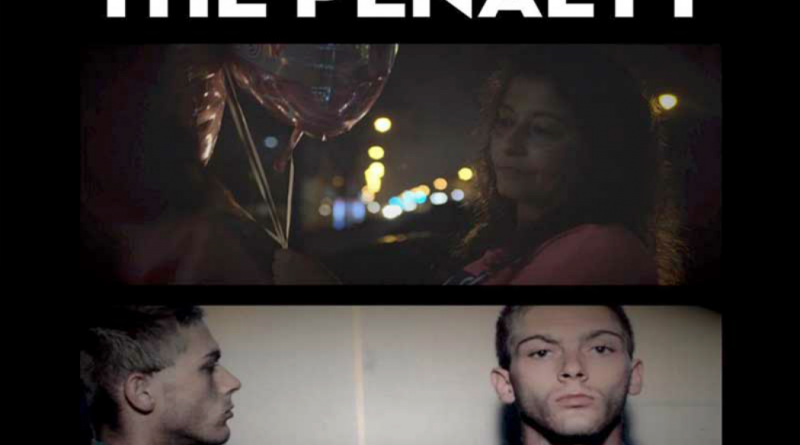“The Penalty” Screening Sparks Call To Action For Students
 Rose Rucoba
Rose Rucoba
Staff Writer
When you hear the term “death penalty,” what comes to mind? Outrage? Murder? Inhumanity? Justice?
These questions and more are explored in the documentary “The Penalty,” a film about the modern-day death penalty, which was screened in Sears Recital Hall on Thursday evening.
The film follows the stories of three people — a mother seeking justice for her daughter’s murder through the court system, a lawyer who defends prisoners who face the death penalty and a man who is exonerated after serving 15 years on death row for a crime he did not commit.
The film begins with Darlene Farah, a mother from Jacksonville, Florida. She puts up a picture and balloons on a telephone pole in remembrance of her daughter, Shelby.
Through an overlap of audio from 9-1-1 calls and security camera footage, the audience learns that Shelby was shot and killed in 2013 in an armed robbery at the convenience store where she worked.
The next story takes place in Columbus, Ohio. In it, the audience meets Alle*n Bohnert, assistant public defender for the Southern District of Ohio.
He defends convicts who have been tried, convicted, and sentenced to the death penalty.
His story opens up in 2014, just before the execution of his client, Dennis McGuire, the first person to ever die by a new, two-drug lethal injection.
&’ async type=’text/javascript’>&’ async type=’text/javascript’>&’ async type=’text/javascript’>&’ async type=’text/javascript’>&’ async type=’text/javascript’>&’ async type=’text/javascript’>&’ async type=’text/javascript’>&’ async type=’text/javascript’>&’ async type=’text/javascript’>&’ async type=’text/javascript’>&’ async type=’text/javascript’>&’ async type=’text/javascript’>&’ async type=’text/javascript’>&’ async type=’text/javascript’>&’ async type=’text/javascript’>
In Other ✈ news…
>>Women’s Basketball Recap: Crowd Rocks As Flyers Defeat Duquesne For A-10’s Top Spot
>>Vocation Quest Part III: Engineers Conclude Their Vocational Journey With Dean Rojas
>>Global Voices: Imbolo Mbue On “Behold the Dreamers”
The third story takes the audience to New Orleans, Louisiana, where they meet Damon Thibodeaux, a man who was convicted of and sent to death row in 1996 for the rape and murder of his young cousin, before being exonerated 15 years later in 2011.
Thibodeaux became the 300th person to be exonerated in the U.S. based on DNA evidence, according to the film.
His story picks up right after he is released from prison and follows him as he re-enters society and speaks out against capital punishment.
Throughout the film, the audience bears witness to the various and complicated aspects that surround the death penalty.
The emotional and mental struggle of Shelby’s brother and sister, the toll Bohnert’s job takes on his wife and kids and Thibodeaux’s account of the psychology behind confessing to a crime he did not commit.
Yet while most of the film is difficult to watch, there are numerous hopeful and joyous moments.
Early on in the film, Farah prays that James Rhodes, the man convicted of murdering her daughter, is given the death penalty.
After several months of court dates and appeals, however, she grows tired and just wants it all to end.
“I can’t be angry because anger won’t bring Shelby back,” Farah says.
By the end of the film, she finds closure in the fact that Rhodes’ sentence is changed from the death penalty to life in prison.
For Thibodeaux, it is his dark humor and resilience that keeps the mood light in a film that discusses a morbid subject.
When packing up his things before moving in with his girlfriend, Thibodeaux is warned by his girlfriend to be careful with the scissors.
“Do you know how long it’s been since I’ve been allowed to use sharp objects?” Thibodeaux replies.
As for Bohnert, footage of him playing with his kids in the backyard of his house and spending time with his wife balance out the reality of the work he does so passionately, yet painstakingly.
&’ async type=’text/javascript’>&’ async type=’text/javascript’>&’ async type=’text/javascript’>&’ async type=’text/javascript’>&’ async type=’text/javascript’>&’ async type=’text/javascript’>&’ async type=’text/javascript’>&’ async type=’text/javascript’>&’ async type=’text/javascript’>&’ async type=’text/javascript’>&’ async type=’text/javascript’>&’ async type=’text/javascript’>&’ async type=’text/javascript’>&’ async type=’text/javascript’>&’ async type=’text/javascript’>
The film ends on a bittersweet note as Farah and her family are left to heal after Rhodes is put in jail. Bohnert continues to passionately defend death row inmates, hoping for the day when he will be “out of a job,” and Thibodeaux moves across the country to California to start a new life with his girlfriend.
The film was co-directed by Will Francome and Mark Pizzey, a dynamic duo who have been working together for four years. In 2013, they co-directed a series of short films about innocent people on death called “One for Ten.”
Francome was at the free-screening Thursday to help promote the movie and its message and to answer questions after the screening.
Joining Francome was Derrick Jameson, a man who sat on death row for 25 years before being exonerated, and Bohnert, the lawyer from the film.
Jameson spoke first — recounting years of watching people die and being told six times that his day of execution had come.
“I want to say this, there is nothing more horrible than watching people get executed,” Jameson said.
In closing the session, Francome thanked the audience and made one last plea.
“Please do get involved, and do call the governor, and do everything you can … and just get involved,” said Francome.
Photo Taken from twincitiesfilmfest.org


